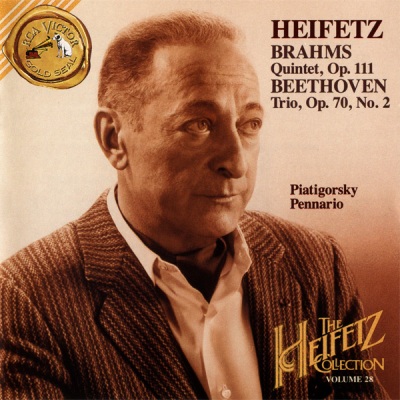
The Heifetz Collection, Volume 28 - Brahms, Beethoven
In a dozen years of increasingly frequent collaboration, Jascha Heifetz and Gregor Piatigorsky formed the personal and artistic bond that led to the creation of the Heifetz-Piatigorsky Concerts in 1961. During the decade that followed, they and a distinguished array of fellow musicians brought to an enthusiastic public both familiar masterpieces and lesser-known gems of the chamber-music literature, and many of these works were recorded. Although most of the Heifetz-Piatigorsky recordings were issued promptly by RCA Victor, a few were not and became the property of the violinist when they remained unissued at the termination of his final contract with the company. The Brahms and Beethoven works on the present disc are appearing for the first time on RCA Victor, together with two shorter pieces this label brought out almost as soon as they were recorded. This performance of the Brahms Quintet, Op. Ill, was the last recording made in the Heifetz-Piatigorsky series, and it is fitting that the two principals have as associates three colleagues familiar to that series: Israel Baker, Milton Thomas and Paul Rosenthal, who had been members of the ensemble for the final (1968) season. Warmth of heart might be considered the unifying thread running through all four items here, most conspicuously in the two biggest ones. Both of Brahms's string quintets—Op. 88 and Op. 111—were products of his happy summers at Bad Ischl, the latter work composed there in 1890 following a spring in Italy. Brahms had completed all his orchestral works by then and apparently decided not to create any more; he advised his publisher, in fact, that the radiant Quintet in G was built in part on sketches intended originally for a fifth symphony. The quintet's exuberant opening movement might well be a souvenir of that Italian spring. The two violas introduce the lyrical second theme, and the movement unfolds with a lovely balance between tenderness and vigor. Tenderness is all to the fore in the succeeding Adagio; it is followed by one of Brahms's characteristic intermezzos, and in the finale he returns to the Hungarian character that had been prominent in so many of his earlier works. It is also in a distinctly autumnal frame—until the concluding section, which caps the work in an unexpected and almost giddy sense of abandon and dancelike exhilaration. Beethoven, of course, did produce a fifth symphony, in the same year (1808) in which he composed the trio recorded here—which has very little in common with that dramatic symphony, but reminds us pointedly that this was the middle of a creative period generally dominated by the element of lyricism. The Trio in E-Flat is the second in a pair whose other component is the so-called "Ghost" Trio. Although it has no sobriquet and is the lesser-known of the Op. 70 pair, the E-Flat maintains a more consistent level of quality throughout its four movements. The Haydnesque Allegretto in particular represents a striking balance between straightforward sentiment and uncontrived elegance. Leonard Pennario, a guest artist from the beginning of these concerts, had adapted to the chamber-music ambience as happily as Heifetz and Piatigorsky themselves. The Boccherini Sonata in D is one of only four works Heifetz and Piatigorsky recorded together without additional instruments. It may be the least demanding of that select group, but it is perhaps the one whose unassuming, ingratiating manner best reflects the friendship, respect and enthusiasm shared by these legend- The Mozart Rondo is the fourth movement of the elaborate "Haffner" Serenade, an eight-movement orchestral work in which movements two through four constitute a miniature violin concerto. Fritz Kreisler's popular arrangement of the Rondo was a lifetime favorite with Heifetz, and one of the works that provided a sort of frame for his huge discography. He recorded it for the first time in September 1920, with the pianist Samuel Chotzinoff (who later became Heifetz's brother-in-law), and again 50 years later, with his longtime accompanist Brooks Smith, for inclusion in his only television "special." —Richard Freed

![Jascha Heifetz《Johannes Brahms (1833-97 Quintet No. 2, Op. 111, in G/G-dur/sol majeur)》[MP3/LRC]](http://imge.kugou.com/stdmusic/100/20150718/20150718085040896366.jpg)
